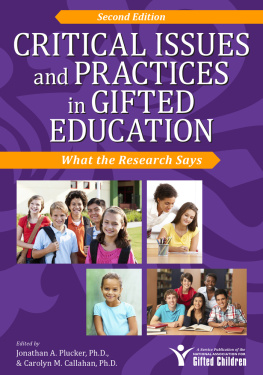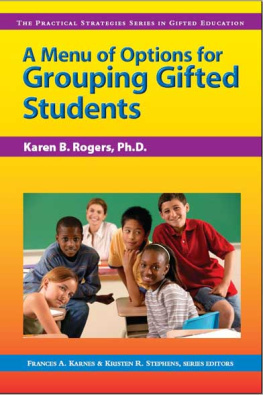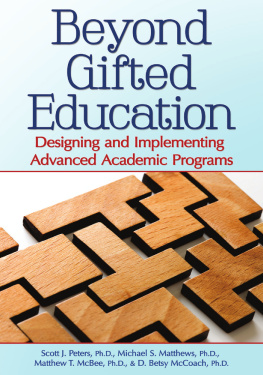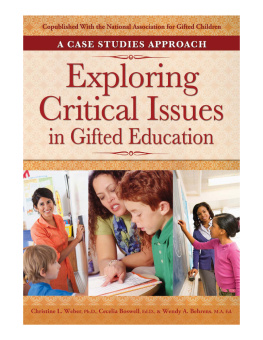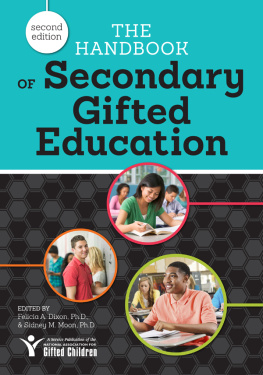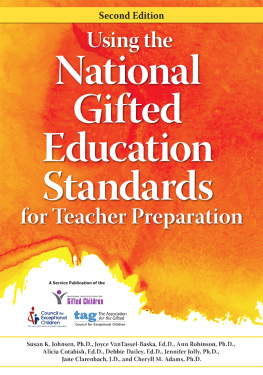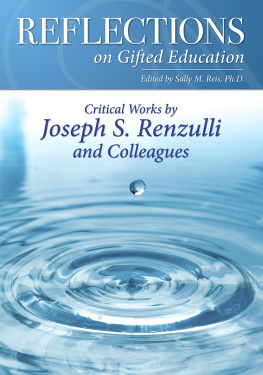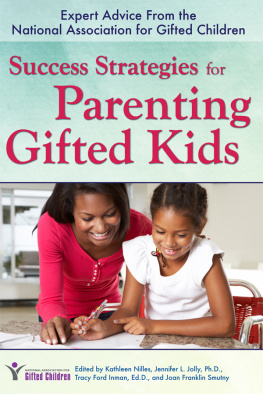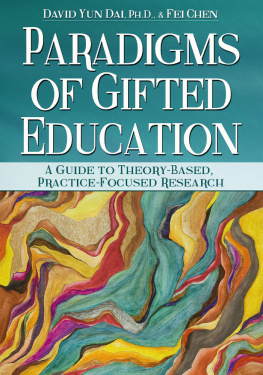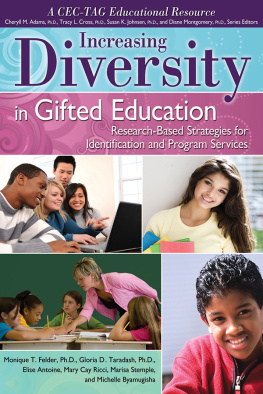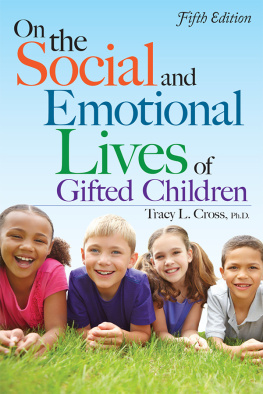About the Editors
Jonathan A. Plucker, Ph.D., is an endowed professor in the Neag School of Education at the University of Connecticut. His research, supported by more than $36 million in external funding, examines education policy and talent development, with more than 150 publications to his credit. Plucker is an American Psychological Association (APA) and American Association for the Advancement of Science (AAAS) Fellow and the 2012 recipient of the APA Arnheim Award for Outstanding Achievement for his research on creativity. His past leadership roles include serving as president of Division 10 of the American Psychological Association and chair of the Research and Evaluation Division of the National Association for Gifted Children. In 2011, he was ranked among the 100 most influential academics in education policy, and his work is widely mentioned in the media, including CNN, TheWall Street Journal, New York Times, and Newsweek.
Carolyn M. Callahan, Ph.D., is Commonwealth Professor in the Curry School of Education, University of Virginia, and the Associate Director of the National Research Center on the Gifted and Talented. She teaches courses in the area of education of the gifted and is executive director of the Summer and Saturday Enrichment Program. Dr. Callahan has authored more than 150 articles, 30 book chapters, and monographs in gifted education focusing on creativity, the identification of gifted students, program evaluation, and the issues faced by gifted females. Dr. Callahan has received recognition as Outstanding Faculty Member in the Commonwealth of Virginia and was awarded the Distinguished Scholar Award from the National Association for Gifted Children. She is a past-president of The Association for the Gifted and the National Association for Gifted Children. She has just completed a term as editor of Gifted Child Quarterly.
About the Authors
Cheryll M. Adams, Ph.D., is Director Emerita of the Center for Gifted Studies and Talent Development at Ball State University and teaches graduate courses in research and gifted education. She has authored or coauthored numerous publications in professional journals, as well as several books and book chapters. Dr. Adams has served as PI or Co-PI on three Jacob K. Javits grants. She serves on the editorial review board for Roeper Review, Gifted Child Quarterly, Journal of Advanced Academics, and Journal for the Education of the Gifted. She has received the NAGC Early Leader Award and BSUs Outstanding Administrative Service Award. She has served on the Board of Directors of the National Association for Gifted Children and as president of the Indiana Association for the Gifted and of The Association for the Gifted. She currently serves on the board of the Florida Association for the Gifted.
Jill L. Adelson, Ph.D., is an assistant professor in the educational psychology, measurement, and evaluation program at the University of Louisville. She earned her Ph.D. in educational psychology with a joint emphasis in gifted education and in measurement, evaluation, and assessment from the University of Connecticut, and she earned her masters degree in curriculum and instruction with an emphasis in gifted education from The College of William and Mary. During her time in Virginia, she taught fourth-grade self-contained gifted and talented students. Dr. Adelsons research interests include the application of advanced statistical methods to examine issues in gifted and mathematics education, including the effects of gifted programming and elementary students attitudes toward mathematics.
Susan G. Assouline, Ph.D., is Director of the Belin-Blank Center and a professor of school psychology at The University of Iowa. She is especially interested in academically talented elementary students and is coauthor (with Ann Shoplik) of both editions of DevelopingMath Talent (2005, 2011). She is codeveloper of The Iowa Acceleration Scale (2009), a tool designed to guide educators and parents through decisions about accelerating students. In 2004, she coauthored A Nation Deceived: How Schools Hold Back Americas Brightest Students with Nicholas Colangelo and Miraca U. M. Gross
Amy Price Azano, Ph.D., is an assistant professor of adolescent literacy at Virginia Tech. Prior to her current position, she was a researcher and project manager on the What Works in Gifted Education study at the National Research Center on the Gifted and Talented (NRC/GT) at the University of Virginia (UVA). As part of her work, she and her colleagues at the NRC/GT received a Curriculum Award from the National Association for Gifted Children. At Virginia Tech, her research focuses on rural gifted education, place-based pedagogy, and the literacy needs of rural youth. Prior to earning her Ph.D. in English Education from UVA, Dr. Azano taught high school English and served as codirector of UVAs National Writing Project site. Her recent publications can be found in the Journal of Research in Rural Education, Journal of Advanced Academics, English Education, and TEACHING Exceptional Children.
Jamie S. Baker, Ph.D., is currently the Acting Director of Secondary Education at New Mexico State University in Las Cruces, NM. Dr. Bakers research interests include secondary preservice teacher preparation, program assessment, and development. She has also researched and published work related to understanding and serving diverse gifted youth. She is a National Board Certified Teacher in the area of Early Adolescent English Language Arts. She is also Co-Chair of a local Professional Development School (PDS) university-district partnership.
Ronald A. Beghetto, Ph.D., is the College of Educations Associate Dean for Academic Affairs and Associate Professor of Education Studies at the University of Oregon. His research focuses on creativity in K12 schools and the influence of past schooling experience on K12 teacher development. Beghetto is a Fellow of the American Psychological Association (Division 10) and has received numerous awards for his teaching, including the University of Oregons highest teaching award for early career faculty (the Ersted Crystal Apple Award).
James H. Borland, Ph.D., is professor of education in the Department of Curriculum and Teaching at Teachers College, Columbia University, where he directs the programs in the education of gifted students. Dr. Borland is the author of numerous books, journal articles, and book chapters. He is editor of the Education and Psychology of the Gifted series of Teachers College Press and is past coeditor of the Section on Teaching, Learning, and Human Development of the American Educational Research Journal. He has lectured on the education of gifted students across the U.S. and abroad, and he has consulted with numerous school districts, primarily as an evaluator of programs for gifted students. Dr. Borland was awarded the Gifted Child Quarterly Paper of the Year Award for 1994 and 2000 and the Award for Excellence in Research from the Mensa Education and Research Foundation in 19891990 and 19992000.
Marguerite Brunner is a doctoral student at the Curry School of Education at the University of Virginia. Currently she works with preservice and in-service teachers seeking endorsement in gifted education. Her research interests include teacher education, assessment, and underrepresented populations in gifted education. Marguerite has also worked at the National Research Center on the Gifted and Talented (NRC/GT) at the University of Virginia where she investigated best practice in gifted education as part of the research entitled What Works in Gifted Education, a study of the National Research Center on the Gifted and Talented.
Thomas Brush, Ph.D.,
Next page
